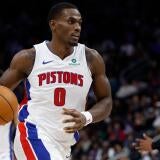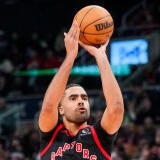
Wolves preview: Four-step plan for success in Minnesota's most-hyped season in years
Yes, the bench is weak and the defense has questions, but here's how the Wolves can cash in on the hype

The Minnesota Timberwolves' 2016-17 season was the biggest faceplant of any team last year. Their expectations were sky high, and the ways they were bad were mystifying. None of their young guys made a leap except for Zach Lavine (and the team was worse with him on the floor) and he was hurt. The defense, in a bizarre twist, was terrible under Tom Thibodeau. The team just never hit a groove, and even when Karl-Anthony Towns put together a phenomenal second-half surge, it was too late.
But this year is a double-down season. They added Jimmy Butler in a sweetheart deal, then snagged Taj Gibson on the market. If last year they were a sure bet to make the leap, they are too big to fail this season ...
Or are they?
There's phenomenal talent on this team, but there are concerns. From Andrew Wiggins' stagnation to a bench unit that cries out for mercy, to an ongoing question of defensive ability and a history of Thibodeau teams underperforming offensively, there are ways to talk yourself out of the Timberwolves.
A successful season for Minnesota means a definite playoff berth, and a mid-tier seed. That's a tough order; teams don't typically go from being lottery squads to a 5th-seed overnight. The talent is there, but how do the Wolves take advantage of it to get where they need it?
I. STAGGER, SWAGGER, DAGGER
The Wolves' bench is a gigantic pile of "Ruh-roh." Oddly enough, they depleted their point guard depth by moving combo guard LaVine and Kris Dunn for Butler, but their three-man rotation of Jeff Teague, Aaron Brooks and Tyus Jones is probably their best depth.
Meanwhile, the rest of Minnesota's depth is concerning to say the least. Cole Aldrich averaged eight minutes per game. Gorgui Dieng's defensive metrics bear out well, but there's a lot on film to be concerned with. Nemanja Bjelica shooting 31 percent from 3-point range last year is pretty concerning, as there's not much else he's great at. Jamal Crawford is the backup shooting guard, and JCraw can still get buckets, but his limitations everywhere else have gotten worse. Shabazz Muhammad is fighting to stay in the league.
This is all to say that if you thought this might be the year where Thibodeau did not run his starters into the ground, you're wrong. The key's going to be staggering his starters, and doing so effectively.
In 2016, Butler spent 30 percent of his time without Pau Gasol, who put in an All-Star-caliber season that year, and 38 percent without Derrick Rose. That's a pretty healthy amount of staggering. Last year was a bit different. Towns spent just 27 percent on the floor without Ricky Rubio, and just 14 percent without Wiggins.
Realistically, the Wolves are going to not only need one of their big three on the floor for almost all the game (which is easy to do), but probably two, and a healthy amount of that time has to be spent with Gibson on the floor as well. Butler can individually keep the offense afloat and help anchor the wing defense. The concerns are when Towns is on the floor without Butler. Towns' defense was especially troublesome last year, and he and Dieng seemed to exacerbate one another's problems, even if they had a positive net rating when Dieng shared the floor with Towns.
If Towns makes a jump defensively, using him to prop up some second- and third-quarter units is probably a good plan. If he doesn't, however, he likely needs to be anchored to Gibson, which could be fine. Put Gibson and Towns on the floor with any three guards and you likely have enough to keep a lead afloat or a deficit within reason until Butler gets back.
What Thibodeau does not need to do is drive his stars into the ground, but that's pretty obvious at this point.
II. WIG UP, WIG OUT, WIGGINS
Wiggins has to be better. And he's in a different role. And he's going to have more scrutiny. And he's getting his massive extension. There's a lot of things riding on this season for Wiggins. If you want to be skeptical -- and I choose to be skeptical -- you have to look at how ingrained Wiggins' game is to him. Wiggins at this point would be best used as an off-ball weapon. His spot-up shooting is actually quite good (72nd percentile last season). His off-the-dribble game is a wreck, and it's the first thing he looks for in pick and roll. Wiggins' feel for the game in pick and roll hasn't been good enough for him to be a real consistent high-usage threat there, which the Wolves need.
Defensively, Wiggins has to stay tethered to the play and manage containment in one-on-one situations better. His isolation defensive numbers were excellent last year, and he'll have easier assignments with Butler taking the primary threat, but there are still times he's caught off guard.
It's easy to suggest that Wiggins needs to make more plays, or rebound, or be more versatile in any capacity, but that just may not be reasonable, as it's not who he is. A best version of him would give the Wolves another real weapon, but Wiggins is one of the most concerning hinges of Minnesota's mechanism this year.
III. ON THE HUNT
Better off-ball movement is going to have to be a must. In preseason, the Wolves' pick and roll numbers are great, but when you look at a lot of the action, you notice that while the spacing is good, so much of it is individual actions, with very little off-ball movement. Minnesota doesn't have incredible shooters to necessarily draw gravity at an elite level, and that's going to mean more help inside.
The Wolves' offense was good last year, but Thibodeau's offensive history in Chicago was that of a junk car rolling downhill. Yes, it gets to the bottom of the hill, but it's not effective or efficient. Better movement will be needed to help with that.
IV. FIND THE WARRIORS
This sounds crazy on the surface, but the Wolves honestly aren't ready to beat most of the top-tier teams. If they can win a 4-5 matchup to get Golden State in the second round, they are one of the few teams that should want to take their shot at the champs. Yes, Golden State will win. Yes, it will probably be a sweep. But Towns gives the Warriors fits, and they have the past two seasons. Throw in Butler, whose Bulls were pesky vs. the Warriors, and they have the personnel to challenge.
What does losing in four or five do for Minnesota, even if it's a tough series? Think of how the 2010 Thunder used their first-round loss to the Lakers as a springboard, or the 2010 Bulls who competed with LeBron's Cavs in a five-game series. There's value in learning where you stack up against a team that dominant, and a proud series -- even in a loss -- does a lot for Minnesota going forward as not just a team that's good, but a team on the rise.
That's a best-case scenario for the Wolves this season. There are pitfalls, but there's also a path to the first truly positive season in Minnesota since Kevin Garnett roamed the sideline.

















